In our modern, internet-connected world, people are increasingly receiving their news from social media. Traditional broadcasters and newspapers such as the BBC, NBC, and the Guardian maintain a strong presence on social media platforms, but in a world where a post is only worth as much as the number of ‘likes’ it receives, their historically strong brand identities – though not necessarily diminishing – are simply not cared about as much today.
Many people today do not go to a television guide to select a news channel they trust, nor do they go to a newsstand, to select a newspaper they trust. Instead, we open Facebook, or Instagram, or Twitter, or Reddit, and have the news fed to us – as curated by the social media platform’s recommendations. And it is not just news and discussion as reported by familiar brands, it is news and discussion as reported by anyone who chooses to report it.
In addition, it is often not the actual content but the presentation of the content that people use to determine trustworthiness – fancy, professional-looking graphics on social media posts and YouTube videos can be very convincing, especially to a younger audience that is more familiar with that style.
RT, formerly known as ‘Russia Today’ before its 2009 name change, is an international television network funded and effectively controlled by the Russian state. It is the country’s outward-facing broadcaster, with its target audience being citizens of the democratic Western world.
Like other broadcasters, RT has been increasing its presence on social media over the past few years and has been overall very successful with its main YouTube page having amassed over three billion total views as of 2020. Unlike other broadcasters, however, it also possesses an unbranded presence: a presence which I would describe as ‘semi-covert’.
A number of political or news-style pages funded or controlled by RT can be found across social networks, operating as sidearms for the Russian broadcaster – without RT branding. I call these types of pages ‘semi-covert’ since the connection of these projects with RT is not secret, and can be found out with enough searching, but it is not made clear either.
Semi-covert pages from any broadcaster are worrying. Most viewers unfortunately do not interrogate the source of social media posts or pages that they come across and so wouldn’t be aware of the context of the production of their content.
In the UK, television and radio programmes are regulated by the independent organisation Ofcom, which insists that all news broadcasts maintain “due impartiality” – a bias or slant is fine, but fairness must prevail. RT has repeatedly fallen foul of Ofcom broadcasting regulations in the past, most notably in 2018 during the weeks following the poisoning of Sergei and Yulia Skripal with Novichok. Ofcom – in a rare move for its broadcasting regulations division – fined RT’s holding company £200,000 for “serious and repeated failures of compliance with our rules”. Of course, other UK broadcasters have had breaches in the past, but this incident was of particular significance due to the sheer number of breaches over a short period of time and the seriousness of them.
RT took Ofcom to court over this judgement, but their case was dismissed by a High Court Justice who agreed that there was “both actual and potential harm” in the coverage.
Ofcom only regulates TV and radio and has no authority over what broadcasters (or any other organisations) choose to post on social media – there is, therefore, no requirement that RT maintains accuracy and fairness on its social media pages.
In addition, when faced with regulatory action from Ofcom in the past, RT has frequently argued in response that their audience “would be well aware they were watching a ‘highly polemic’ current affairs programme” and that they should know to expect a “Russian viewpoint”. This justification falls flat when it comes to RT’s unbranded semi-covert operations.
Editor-in-chief Margarita Simonyan, in an interview (in Russian) for the Russian newspaper Kommersant where she repeatedly attacks CNN and the BBC and tries to convince Russian taxpayers that it is important that they fund RT (despite it not even broadcasting in Russian), revealingly said that the broadcaster is as important to Russia as a “Ministry of Defense”.

RT editor-in-chief Margarita Simonyan. Image: Kremlin.ru / CC BY https://creativecommons.org/licenses/by/4.0, via Wikimedia
Many have denounced RT as a propaganda channel, purporting that its job is to spread disinformation for the benefit of the Kremlin’s political motives and that their journalists are perhaps told what to write and what to say directly by the Russian government. Alas, the real story is much more complex and nuanced than that.
RT journalists do not receive some sort of direct instruction from ‘higher-up’ telling them what to say and what to report. Of course, they may receive editorial direction, but only to the same extent that journalists at other media organisations may do. In saying that, I am not proclaiming RT to be innocent and faultless. I believe that RT and its journalists do present distinctly pro-Kremlin and sometimes purposefully confusing coverage (by ‘casting doubt’ over a widely held consensus), but that this is a result of the organisation’s culture rather than instruction from above.
RT’s narrative is that it is providing an authentic and ‘alternative’ look at the world, its journalists often using conspiracy theory-esque language such as ‘the mainstream media’ and ‘the establishment’: lazy labels used to discredit other organisations. These are terms that sow distrust in Western institutions – and this would seem to be RT’s intention.
The broadcaster treats the so-called ‘mainstream media’ as if it is a groupthinking monolith. Many of its criticisms of media organisations are valid, but it fails to see nuance in their respective outputs. In the UK, there is a rigorous debate going on about our news: are certain organisations too left-/right-wing in their analysis and reporting? How should the BBC be funded? Do the Murdochs have too much dominance over the media? Is it right for a news organisation to try to be impartial and, if so, to what extent?
Meanwhile, RT shouts from the sidelines, carelessly proclaiming the wickedness of the ‘establishment media’ (i.e. media organisations based in democratic nations). RT UK boss Nikolay Bogachikhin even once claimed that the “mainstream media” experienced “jealousy” and “fear” towards RT and its presenters.
The sad truth is that RT, with its global reach and funding capacity, has the potential to be a really decent broadcaster – it could adopt a similar questioning style and mission statement to a programme like Channel 4 News, and RT could bring really excellent reporting and high-quality and engaging investigations to the world. But whilst most news organisations will try to set themselves apart from others with quality programming and reporting, RT lazily tries to promote itself by simply discrediting others. I believe that many would welcome being able to hear the ‘Russian perspective’ on political events – but RT goes far beyond this noble idea, producing content for TV and its website that can often be described as materially misleading.
The majority of the broadcaster’s content is quite normal however, even if it does present a slant, and – to its credit – RT has occasionally produced some worthwhile reports. But when needed, the organisation and its journalists are able to spin into action, acting in favour of Russian interests – whether by casting doubt on the true perpetrators of the Skripals’ poisoning or the MH17 plane crash, or by offering a staunch defence of major Russian foreign policy incidents such as the annexation of the Crimea.
Evidence of interference by the Russian state over the past several years seems to suggest that the Kremlin is intent on creating division and chaos in the democracies of the Western world. We must resist attempts to divide us, turning us against ourselves and our institutions – wherever these attempts come from. But as part of this, it is important that Russia is not used as a scapegoat or a bogeyman for political occurrences that we may consider adverse, nor that Russians face prejudice based on the actions of their government. We must be reasonable and rational, and in this report I have attempted to follow these principles.
Part 1 – In Case You Missed It
At a first glance, ICYMI (an initialism of ‘In Case You Missed It’) would seem to be a modern social media-focused political news/discussion platform like any other, adopting a similar style to media outlets like Buzzfeed News. In reality, however, ICYMI was a subsidiary operation of RT’s UK division.
RT UK is based in the high-profile Millbank Tower by the River Thames, London, occupying multiple floors. Here, they have television studios along with office space used by staff and journalists, including those who worked on ICYMI.
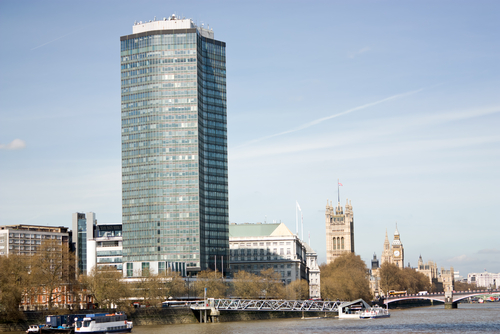
Millbank Tower, London. Image: Shutterstock
Developed by a small group of RT’s London-based staff, ICYMI primarily operated through its YouTube channel and Facebook page, though it also used Twitter and Instagram. The project officially ceased operations in February 2020. The pages are still active, but they no longer publish new ICYMI content, instead posting clips from one of RT’s new, branded productions (named “#PollyBites”, they are not an ICYMI creation, but they are published on the ICYMI page as they are presented by its former host. These do feature the RT logo, but prior to ICYMI’s shutdown no RT branding was present on any of the videos).
The project was begun by Simon Offer, a writer at RT UK who goes by the pseudonym “Simon Rite”. He regularly writes opinion articles under this name for the RT website and also goes by this pseudonym in ICYMI’s videos, with a series presented by him titled “Rite On”.
The self-described “ICYMI mastermind” currently lives in London, but a personal social media page indicates that he has family links to Russia and used to live in Moscow.
I contacted Mr Offer and asked him a few questions about ICYMI.
He told me that ICYMI had “no specific aims”, and that the videos were made “in the hope that someone might enjoy them”. With respect to why it came to an end, Mr Offer said that “the numbers no longer justified the time, effort and resources to maintain the team”.
With regard to the Russian state-funded nature of RT and ICYMI, he also told me, vaguely, that “people see what they want to see” and that “other people’s concerns didn’t concern me”. Stating that they were “creatively free”, Offer said that ICYMI’s creation was not influenced by anyone from the “wider RT organisation”.
All About Polly
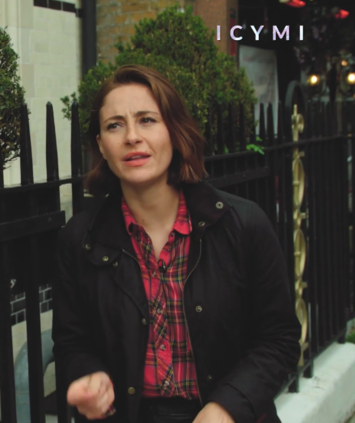
Polly Boiko. Image: YouTube/ICYMI
ICYMI cannot be discussed without speaking about its main host: real name Polina Boiko, the charismatic presenter goes by the anglicised name Polly. Boiko is an attractive Russian woman who speaks with a strong London accent and was brought up in the UK, having attended an independent school in London’s affluent Hampstead area. In a Q&A video on the RT YouTube channel, Boiko describes herself as “Brussian” (a portmanteau of ‘British’ and ‘Russian’).
Later going on to study English Literature at University College London, Boiko is an intelligent woman who also appears to be a passionate Russophile. She joined RT as a correspondent in 2011, soon becoming one of the UK division’s most prominent reporters. I understand that following the shut-down of ICYMI, Ms. Boiko became a Senior Editor and no longer appears on RT’s programming outside of her new short-form social media videos (which are, thankfully, branded).
When ICYMI launched in 2018, Boiko became the flagship presenter: her face and name are plastered on its branding.
ICYMI’s initial video, presented by her, is one of the YouTube channel’s most popular – and also serves as an excellent example of the style of the project. In the video, ICYMI latch on to President Trump’s criticism of the decision to move the US Embassy in London to a new location. Boiko jokingly discusses the architecture of the building, saying that a moat around it would “clearly” be a necessary amenity for the Americans considering “some of the stuff that America gets up to”, and that it is “a big square building in a depressing bit of London”, before embarking on a tangent about how the neighbouring buildings had been involved in criminal activities.
She also says that its close proximity to the MI6 building and the Houses of Parliament would help the “US and the UK … plan their next Middle East intervention using unhackable smoke signals” and allow the British government to more easily “ask for America’s permission to breathe”.

Polly Boiko in ICYMI video “It’s big. And square. And Trump don’t like it”. Image: YouTube/ICYMI
In 2018 a few publications including NBC News and The Times covered ICYMI, respectively discussing how it “looks and sounds like the kind of online news millennials love” and how Russia is “targeting British teenagers”.
Later that year Polly Boiko responded in an article written for the Spectator USA, defending ICYMI and poking fun at how news organisations had claimed that her team were involved in “seriously sinister activities” (her description).
I approached Ms. Boiko with regard to RT and ICYMI. She replied, but unfortunately was unavailable to respond to my queries before the publication of this report.
A detached but helpful hand for the Kremlin
ICYMI did not make clear of the link between themselves and RT. However, an individual intent on finding out the background wouldn’t have struggled to discover it.
So whilst it seems that RT was not trying to hide the relationship, an unsuspecting viewer would likely not have been aware of the link – hence my term ‘semi-covert’. As said previously, most people unfortunately don’t interrogate the source of the informational content they see on social media, and so RT’s lack of clear branding on their videos here – which any respectable broadcaster would have – is worrying. Many of RT’s other shows do have the RT branding, and so the absence of it on ICYMI videos would seem odd.
Since mid-2018 however, YouTube has branded ICYMI’s videos with a glaring tagline stating that the channel “is funded in whole or in part by the Russian government”, and Facebook makes clear that the ICYMI page is “Russia state-controlled media”.

Image: YouTube/ICYMI
ICYMI’s videos are pretty engaging, thanks both to Boiko’s charismatic presentation and the high-quality editing; the project still never achieved much success, however.
For a social media news page, their viewership figures are not great, especially for a project that had been running for just over two years (and, of course, with all the well-established resources and facilities provided by RT). It is of course possible that YouTube and/or Facebook have blocklisted ICYMI from appearing in users’ recommendations (at all or as much as normal) due to its state-funded nature and their possible perception of it as having a lack of editorial independence – but the point still stands, nonetheless.
With regard to the content itself, though ICYMI may claim to jest at everyone and everything, its videos are distinctly anti-Western. There are numerous examples of the videos that are anti-Israeli, anti-Saudi, anti-European, anti-American, and anti-NATO, and there are also a couple of videos implying Russia’s innocence with respect to the poisoning of Sergei and Yulia Skripal with Novichok. I have not, however, identified any videos that criticise or mock Russia or any of its political figures.
This isn’t to say that the ICYMI writers were told to create this kind of content, but more likely that the culture of the RT organisation encourages this kind of anti-Western attitude.
The videos on the Novichok poisoning seem to attempt to cast doubt upon the truth of the events. This is commonly done by RT – under the sanctuary of its tagline “Question More” the broadcaster will try to make it seem as if there are multiple plausible explanations for an event, even when there is a very strong consensus. It will then attack the so-called ‘mainstream media’ for ignoring the alternate perspectives that RT likes to treat as equally valid.
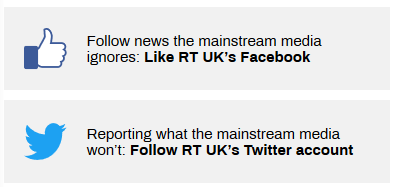
Screenshot from the sidebar of the UK section on the RT.com website. Image: RT
Satire & other methods
One of ICYMI’s key distinctions from the rest of RT is that it delivered its content through satire. Often, host Polly Boiko would adopt the opposing position of the viewpoint that is trying to be put across, in such a way as to mock those who share the position that she is pretending to support. For example, one of their most popular videos is titled “Whatever goes wrong, you can always blame a Russian!” and seeks to promote the idea that Russians or the Russian state are commonly the victims of misattributed blame (of course, this in particular is not necessarily a bad cause – though the video does diverge into other things too).
In addition, a key tactic of ICYMI seemed to be to try to simplify and mock the concerns people may have. This can be seen in another video defending Russia (“How to spot Russian interference in the US midterm elections”), where Boiko says “if you meet a Russian, any Russian, you’ve been tampered with”, and encourages viewers to “always find out who is signing the paychecks” when their “attention is captured by a bright and mildly funny online video about politics” – referring to the videos that they themselves produce.
This technique of belittling concerns, in particular about ICYMI, was often repeated by the team. With a seemingly mocking attitude, the ‘About’ or ‘Bio’ section of their Facebook and Twitter pages currently state “via @RT_com, if you’re worried about that kind of thing”, attempting to ridicule viewers who may be concerned or are trying to interrogate the source of the content.
Many of the videos plainly try to disseminate a clear message. There are examples of videos that attack European defence efforts, such as one about the proposed EU army and one mocking Sweden’s war effort – saying that “they’re f**cked” if they’re relying on millennials, who “won’t be standing for any of it”. The US is a big topic too, with Trump and the “Disastrous Democrats” regularly mentioned.
A potent example of the combined use of satire and the technique of ‘casting doubt’ can be seen in particular in one video about the Salisbury Novichok poisonings where Boiko asks the viewers: “So some of the world’s most highly trained assassins were dropping deadly Novichok across sleepy southern England: what the hell happened!? The alleged targets still managed to go for a drive, stop by the pub for a pint, have some pizza, take a stroll, before passing out on a bench and spending a few weeks in hospital. But wild speculation is good enough for me because: Russia definitely did it”.
This type of unfair and improper content, which misrepresents the consensus of the case by failing to adequately consider the highly probable conclusion that the Russian state was behind the poisoning, is precisely what RT UK was condemned for by Ofcom for broadcasting in 2018.
The European Union’s counter-disinformation taskforce describes RT’s intent as to “confuse” and “disinform”, and I think that it can quite clearly be seen that much of the content created by the ICYMI team (like with RT as a whole) was indeed intent on creating a level of confusion and, more importantly, evoking a sense of distrust in Western governments and (especially media) organisations.
Moreover, the Integrity Initiative Guide to Countering Russian Disinformation, a 2018 publication from the UK-based Institute for Statecraft think tank (and a document which was cited in the recent Russia report released by the House of Commons Intelligence and Security Committee), says that “It is frequently the case that disinformation is not intended to be believed by the target audience. It is usually sufficient for the disinformation to sow sufficient doubt in the minds of the recipients that they refuse to believe anything that they hear about a particular incident. When people start to say, ‘You don’t know what to believe’ or ‘They’re all as bad as each other’, the disinformers are winning.”
It should be noted that the EU’s counter-disinformation taskforce is quite opinionated and does (unsurprisingly) present a strong pro-European bias, and the Integrity Initiative has received a large amount of funding from the UK Foreign Office. I am not offering endorsement for either of these organisations/projects, but I include these individual quotes as I believe they provide an accurate insight into RT’s activities.
NBC News’s investigation and an overview
As said previously, I believe it to be important to write fairly and accurately when reporting on foreign state activities. Unfortunately, this isn’t always done well by some journalists (especially in US media organisations, which are highly polarised), whose reports’ basis may simply rely on their readers having an anti-Russian sentiment.
The relationship between ICYMI and RT was first prominently reported following an investigation by NBC News journalist Ben Collins into ICYMI’s website’s domain, which shared registration information with one of RT’s other sites.
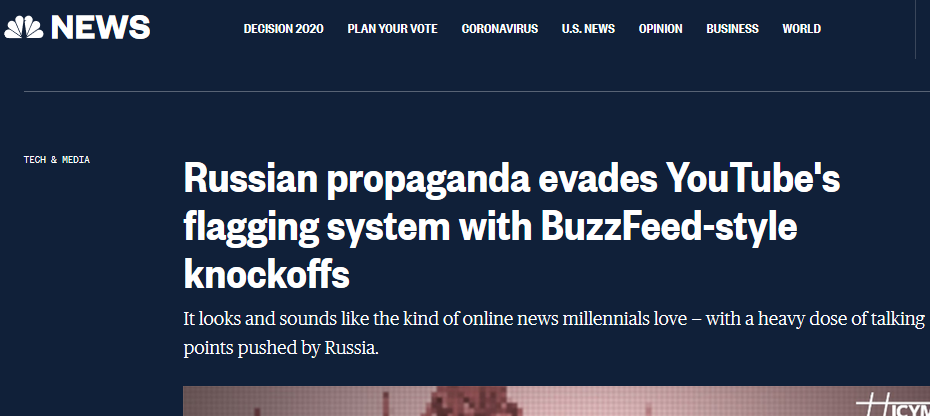
NBC News’s report on ICYMI. Image: NBC News
RT then confirmed to NBC News the relationship, stating that “ICYMI is prominently featured as a show on the RT.com website and is helmed by a well-known RT reporter”.
Whilst I think that Collins was right to be concerned about the lack of transparency surrounding the project (as am I), he did not really address the content of the videos, other than to say that they pushed Russia’s “talking points”.
The ICYMI team published a response video a few days later, mocking NBC News’s investigation.
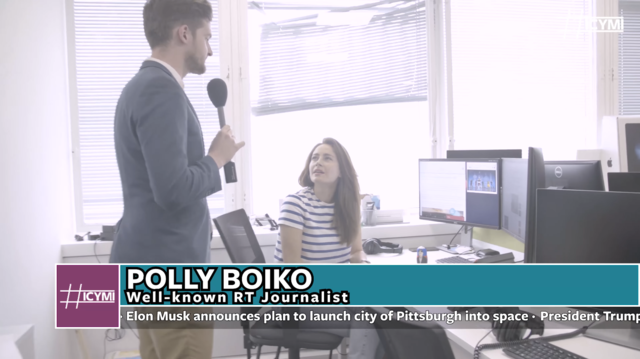
Polly Boiko and other members of the ICYMI team appear in a video where they mock NBC News’s investigation. Image: YouTube/ICYMI
Collins later went on Twitter to claim that ICYMI had “joined in with literally every other Russian propaganda channel saying Assad had nothing to do with yet another chemical attack of his own people”. However I have found no evidence that any of ICYMI’s videos, including the one referenced by Collins in his tweet, ever said or expressed this.
The article also says that in one of ICYMI’s videos it had been “falsely claimed that U.K. Labour Party leader Jeremy Corbyn had said Russia ‘definitely didn’t’ poison Skripal.” Whilst this was said by Boiko in one of the videos, it was in the context of a satire routine where a second version of Polly would appear on screen to correct the statement of the first and, in this case, the ‘second Polly’ did indeed (correctly) say that Corbyn had only urged that the country waits for more evidence.
Mr Collins also reported that Polly Boiko was a former RT reporter – despite the fact that she quite clearly still was one.
I think that Ben Collins regularly reports on disinformation-related topics well, but in this particular article he seems to have become blindsided by the fact that RT is Russian-funded and has fallen short of providing a proper analysis of the ICYMI project.
This is unhelpful in the fight against disinformation and will only serve to aggravate the RT journalists who already believe that the so-called ‘mainstream media’ has it in for them.
British publications such as the Times and the Guardian reported on ICYMI better however, in articles that considered ICYMI and its context as part of RT in greater detail.

Polly Boiko (left) and Simon Offer. Image: YouTube/ICYMI
Despite the best efforts of Offer and Boiko, their content never succeeded in reaching any significant number of people. This, of course, does not mean that ICYMI had no effect – its videos were seen by many and they will have helped to exacerbate viewers’ anti-‘establishment’ sentiments.
ICYMI also serves as a fascinating case study, not only in the methods of modern disinformation but also in the consideration of the context of its production. This was not a project developed in some dark corner of Siberia, but a project developed in Britain by people who live in Britain.
Part 2 – Maffick and its complex history
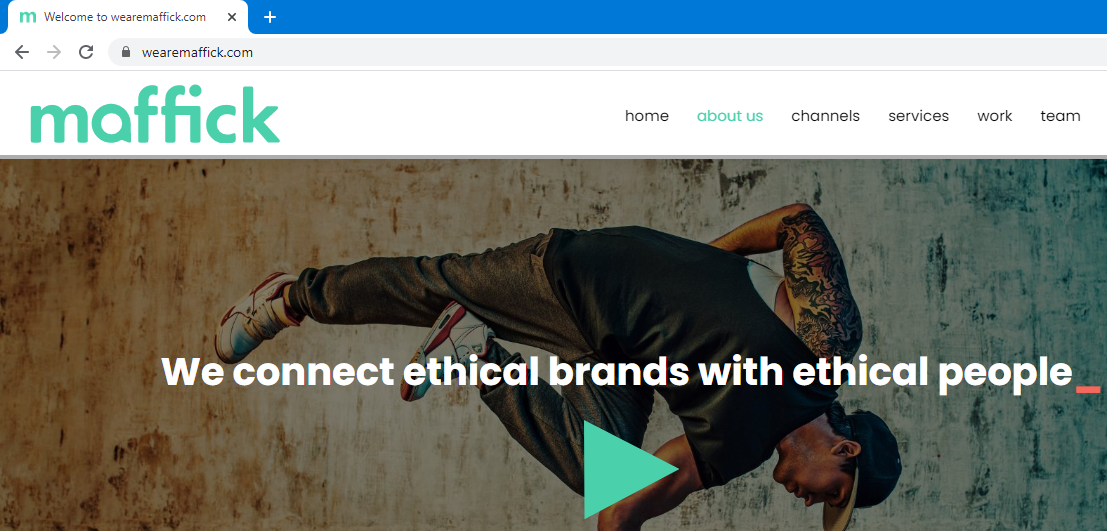
Screenshot from Maffick’s website. Image: Maffick LLC (wearemaffick.com)
Although ICYMI may not have enjoyed much success, there is another RT spin-off that quite certainly has. In the Now is a popular social media page with almost five million Facebook followers and over 160 thousand Instagram followers, and that has links to Russia Today (though in a more complex way this time).
In the Now began as a programme broadcast on RT and, according to Buzzfeed News, became a standalone project in 2016. It is currently run by Maffick LLC – a company headquartered in Los Angeles but registered in Delaware through the specialist corporate services provider Vcorp Services.
Maffick LLC’s sole shareholder is Anissa Naouai, a US national who was educated at the Moscow Art Theatre. Graduating in 2005, Naouai joined RT the next year and later became a Senior Correspondent. Indeed, RT’s aforementioned former programme named In the Now was anchored by her.

Former RT host and Maffick boss Anissa Naouai. Image: RT (Russia Today) / CC BY https://creativecommons.org/licenses/by/3.0, via Wikimedia
In February 2018, Ruptly GmbH, a well-known Berlin-based news organisation and subsidiary of RT, formed two other companies: Maffick Media GmbH and Redfish GmbH. Anissa Naouai became Managing Director of Maffick Media whilst Elizabeth Cocker – a British woman who uses the pseudonym Lizzie Phelan and who, like Naouai, also used to be an RT reporter – became the Managing Director of Redfish.
Redfish is yet another one of RT’s semi-covert operations and is moderately successful, with over 600,000 Facebook followers – however I won’t be focusing in on it in this report. After a brief investigation in late 2018, German newspaper Süeddeutsche Zeitung reported (in German) that Ruptly GmbH, Maffick Media GmbH, and Redfish GmbH all operate from the same Berlin address.
Maffick runs a few different brands of its own. Its main one is In the Now (its “flagship” channel), but it also has Waste-ed (its “eco-sustainability” channel), Soapbox (its “politics and opinion” channel), and Backthen (its now-defunct “history” channel) – though (importantly) much of Maffick’s content is shared between the pages.
In February 2019, Facebook suspended all four of the company’s pages, following a CNN investigation into Maffick’s activities, but about a week later it restored them having required Maffick Media to disclose its Russian ownership in the ‘About’ section of its Facebook pages.
Seemingly keen to get their labelling removed, a Delaware-based LLC (limited liability company) was registered for Maffick in late July, with paperwork to operate in California at their new Los Angeles headquarters being filed shortly after. Maffick was then able to legitimately change the information in the About section of their pages to state: “Maffick is a Delaware limited liability company owned and operated by Anissa Naouai”.
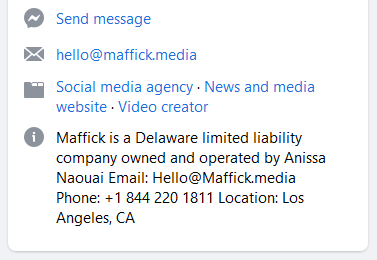
Image: Facebook
Berlin-based Maffick Media GmbH still exists, with Ruptly/Naouai as joint-owners, but it would seem to be inactive.
However, in June 2020 Facebook announced in a blog post that it had introduced a proper framework for labelling state-controlled media, no longer having to rely on manually telling state-backed organisations to disclose information about themselves in these About sections.
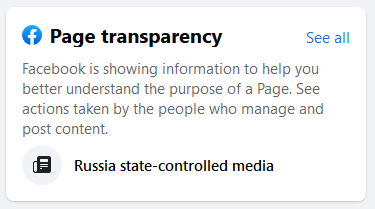
Image: Facebook
This meant that Facebook’s new, official labelling was now on Maffick’s pages – and the social media company refuses to remove this, despite Maffick’s pleas of independence. So, in late July 2020, Maffick LLC announced that it would be suing Facebook for “defamation, unfair competition, and infringement in its commercial rights”.
I contacted Facebook for comment, and a spokesman told me: “We want people to know if the news they read on Facebook is coming from a publication we believe is under the control of a government and we’ve made public the criteria we use to make this determination.”
Their determination criteria can be found in their aforementioned blog post from June 2020.
With respect to Maffick LLC’s legal action, the Facebook company spokesman said that “This lawsuit is without merit and we will defend ourselves vigorously.”
Coincidentally, a few days later Twitter too began labelling state-affiliated accounts. This included In the Now, which now has all of its posts on the platform emblazoned with the tagline “Russia state-affiliated media”.
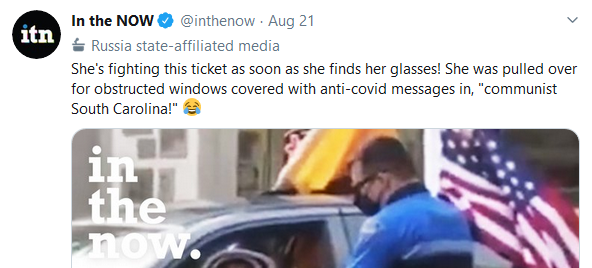
Image: Twitter/@inthenow
All in all, the complexity of the ownership and control of these pages is huge. To review: they are run from an office in Los Angeles, by an LLC registered through a specialist incorporation firm in Delaware, but formerly operated by a GmbH registered at the same office address as RT’s Ruptly. And, their owner used to be a prominent RT presenter who studied in Russia.
As a result of this complex history and ownership structure, it is very difficult to determine the level of connection RT currently have with In the Now and Maffick’s other pages. Maffick is adamant that there is no connection, but Facebook and Twitter are clearly confident that a relationship exists – it is hard to say for sure when it comes to the technical details however, though we may well learn more about Maffick from in its court case with Facebook later this year.
To be clear, I cannot ascertain that Maffick is currently in any way editorially or financially linked to RT. However, I have chosen to still include an analysis of its activities in this report as I believe that it was, at the very least, greatly inspired by RT and that its culture reflects RT’s.
Maffick’s content
But what about the actual content it is producing?
Maffick’s videos are well produced and all of its content is well branded – the company has set up its digital presence well. The videos are in a standardised format, well subtitled and easily sharable, and credits and locations of videos used also appear on screen. For videos filmed in the contested territory of Crimea, annexed by Russia in 2014, the labelling simply appears as ‘Crimea’, with no country named.
In the Now’s content is largely quite typical for a social media page, with a large array of uplifting, inspirational, interesting or funny videos. Some videos are originally taken from social media and republished, others are taken from footage from other media organisations, and others are bought on a licence from viral video distributors such as ViralHog.
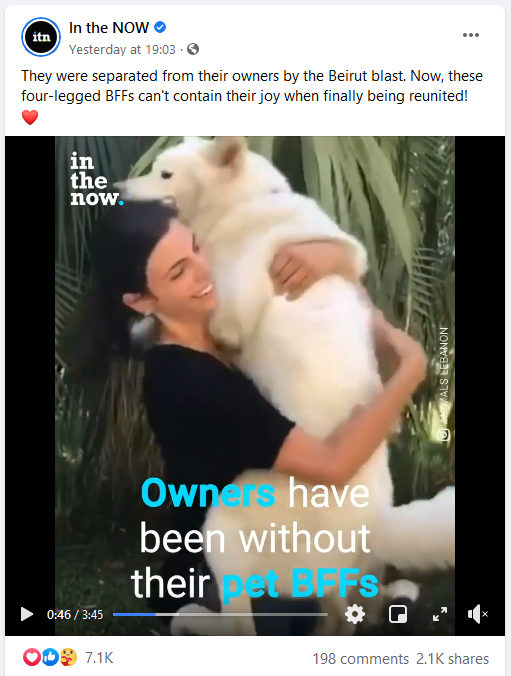
A positive, uplifting video published on In the Now’s Facebook page. Image: Facebook/In the NOW
It seems to be styled after the similarly named US social media page Now This News.
However, the uplifting and positive videos are very regularly interspersed with ones of a different nature. On the In the Now page, Maffick regularly posts ‘social justice’ style videos, most recently including ones about police brutality, people not wearing masks, schools being reopened despite coronavirus concerns, and aggressive women nicknamed ‘Karens’. These videos are accompanied by commenting taglines from Maffick, for example in one about the reopening of American schools: “Expecting kids to stay seated, wear a mask, and not touch anything for 8 hours straight daily? What world is this?”.
My point is not that it is wrong to be publishing videos like this. My critical focus is in particular on why Maffick might be expressing such a strong ‘social justice’, anti-‘establishment’ stance through its outlets.
Maffick also posts a great deal of political content, through In the Now but also its Soapbox page. The content is heavily biased in favour of the ideals of the modern American far-left, and they present and promote the same divisive and regressive identity politics that is increasingly popular in the country (a topic well discussed by Matthew Syed in his recent article for The Times). The content aggregation company’s messages are so potent that they even express dissatisfaction and anger at many on the left, saying that the “Republicans and Democrats are so similar” and that its “almost like this whole system is rigged”.
In one example on the Soapbox page, home to the more extremes of Maffick’s politically charged content, their journalist/’activist’ Rania Khalek sarcastically celebrates that the election of Democratic Vice President candidate Kamala Harris would “finally” mean that “women are in charge of the war industry”.
In another video, published under the Soapbox brand but also shared on the In the Now twitter page, Khalek says that Harris is “just the same contents with different wrapping”, and that she is a “hawkish Wall Street-serving lover of Israel who locks up black people”.
Whether independent from RT and Russia or not, Maffick tries to push its followers to an extreme, urging them to be dissatisfied with all aspects of political discourse.

A video starring Rania Khalek published on the Soapbox Facebook page, concerning “American exceptionalism”. Image: Facebook/Soapbox
The organisation is profoundly anti-American, both in the content it produces itself, and in the content it selectively sources and redistributes. Not everything on its pages is political however, and some of its content is quite positive, especially on its “Waste Ed” page where environmental consideration is promoted.
The word ‘astroturfing’ may be particularly appropriate when it comes to defining Maffick’s strategy. Astroturfing is a play on the term ‘grassroots movement’ and describes how a company or other organisation will pose, typically online, as an ordinary campaigner or campaigning group supporting a business product or a political cause. Seeming to be like any other grassroots campaign, other supporters of the topic or product in question and those of the opposing view are fooled into thinking it is a genuine campaign. Much of the ‘grass’ of the grassroots campaign is therefore faked – hence the term ‘astroturfing’.
Not only will Maffick’s content push supportive viewers to a further extreme, but it will also push away those opposing these radical views, potentially causing them to associate this far-left rhetoric with everyone on the left in America.
Even if Maffick is now financially and editorially independent from RT, it still maintains the anti-‘establishment’ themes of the Russian broadcaster. I believe it to be a genuine concern that the organisation is laying virtual astroturf across the pitches of more extreme political perspectives, legitimising those avenues for many, whilst turning away moderates and entrenching division in the United States.
I contacted Maffick LLC to query their (and Anissa Naouai’s) current relationship with RT, including their financial relationship.
A spokesperson responded to say that they “are an independent US company with several channels, one of which got its start as a TV show on RT”. With respect to Facebook’s labelling of them as Russia state-funded, Maffick told me that this was an “error” which they were “working on clarifying”. They claim that the Atlantic Council, a US think tank, had lobbied Facebook to inaccurately label their pages “for political reasons”.
(N.B. Interestingly, on the Soapbox Facebook page it actually currently says “Affiliated with RT”. Considering Maffick’s denials that it has anything to do with RT, this seems odd. However, court documents filed by Maffick LLC in their complaint against Facebook, which I have read, state that they added this in May 2020 as a “temporary, stop-gap measure” due to concerns that “Facebook would follow through on its threat to shut down [Maffick’s] pages completely” – despite the fact that this message about RT affiliation is apparently “inaccurate”.)
In review
ICYMI and In the Now are both examples of Russia-linked social media influence projects. In the case of ICYMI, the link is clear – it was a part of the Russia state broadcaster. In the Now’s (and sibling pages’) current link, as previously explained, is less apparent though.
In both cases however, the creators and journalists behind it will argue that they are editorially independent and, as I established in my introduction, this is most likely largely true. Neither of these projects is a high-level Kremlin-directed operation, but they were both (at the very least) initiated by an organisation that acts for the Russian state – and have gone on to act in its interests.
Maffick’s anti-Americanism and ICYMI’s anti-Western cynicism exist, I believe, as a result of institutional cultures. RT journalists convince each other and their new recruits that they are the sole proprietors of the unadulterated truth, the only ones unafraid to report on controversial topics, unlike the big bad ‘mainstream media’.
Interestingly, earlier this year Polly Boiko met David Icke, a well-known British man who promotes false conspiracy theories about vaccines, coronavirus, and Bill Gates. She wrote about her day with him in an article published on the RT website. Though Boiko admirably tries to make clear that his beliefs are untrue, this is something that she – as an RT journalist who normally writes and presents in such a way as to make all perspectives seem equally valid – struggles with. There is a mismatch between the content and style of the article: she rightly tells us that what Icke is saying is blatantly wrong, but still maintains RT’s anti-‘establishment’ style in her writing, for example in her title saying that he “is the man UK establishment fears” (bold emphasis mine). Although she does rightly challenge Icke’s incorrect beliefs about vaccines, Boiko expresses a lack of comprehension with respect to how his views could possibly be harmful, stating that “the tosh Icke is chatting” is only “apparently” dangerous, characterising him as a quite lovable and “fruity” character. After seeing him interact with a fan, Boiko does later concede that his views may indeed be dangerous, but still asks why Icke should be gagged, since his incorrect views are so “outlandish” – for some reason concluding that the outlandishness of a false claim acts as an inverse to its believability or potential harm to the public.
(During the course of the COVID-19 pandemic, BBC News have been reporting on the human cost of misinformation. Highlighting the harm that misinformation can cause, reporter Marianna Spring writes that one man, who believed a false conspiracy theory that coronavirus is a ‘hoax’, or somehow linked to 5G radio waves, has now sadly lost his wife to the COVID-19 disease.)
Towards the end of her article Boiko argues that Icke shouldn’t be banned by social media companies and venues. Without any sense of the irony that should come from writing these words on the RT website, she says that taking a stance against Icke will “only feed him … vindicating the ‘THEY have to stop me telling you the truth’ conspiracy, it’ll feed his sense of self-importance, because he is the chosen one, bestowed with all this knowledge, and ultimately, it’ll feed his popularity”.
The reality of it all is that there are plenty of journalistic and news-gathering organisations that do genuinely report ground-breaking stories, or will offer a fair and considered alternative view, unthought of and largely unquestioned before – but RT is not usually one of them, producing worthwhile reports quite infrequently and rarely making headlines for breaking their own major story, or reporting on their own exclusive.
In Maffick, there seems to have spurted an unhinged spin-off of RT’s culture. Further taking out her anger on ‘the establishment’, Anissa Naouai, having enlisted the previously mentioned far-left anti-capitalist Rania Khalek, has taken her RT In the Now show to social media to teach Americans of the apparent evils of their government, taking advantage of the views of and further encouraging the government-hating identitarians of the American far-left.
Ironically, much of Maffick’s content expresses viewpoints that ICYMI’s Polly Boiko and Simon Offer have ridiculed and argued against, in their criticisms of what they might characterise as the ‘snowflake left’.
That’s not to say that Boiko and Offer are the opposite of the Maffick writers. It’s more that their aims and style were different. In actuality, the two UK-based journalists seem to hold rather moderate views on a lot of issues, an approach perhaps better suited to the more moderate British audience.
It still does seem to me that ICYMI’s videos are often needlessly divisive, however. Their cynical nature does not aid the ambition to resolve disagreements in society and, even ignoring the disinformative nature of some of the videos, ICYMI does not seem to be a particularly positive creation.
Broadcasters should seek to enrich people’s lives. Regardless of views on its actual policy decisions, the BBC’s established remit to “inform, educate and entertain” is an inarguably good, positive mantra. RT, with its overtly aggressive snipes at the ‘mainstream media’, a focus which seems to obsess and dominate the minds of so many of its journalists, does not seem to possess similar values.
News programmes can present themselves as highly questioning without needing to attack other broadcasters and the so-called ‘mainstream’. This would be a much more positive approach.
Questioned More
Before researching these two case studies, I set out to try to be fair in my analysis. Many articles that discuss RT or something that it has been involved in simply mention the fact that it is Russia state-funded, and this is used as the sole substance of the argument for why RT is bad.
I do agree with the judgement that RT is a negative force, and I agree with the measured view of the UK telecoms regulator Ofcom that RT has failed to provide due impartiality in the past. I also believe that RT intentionally creates and casts doubt upon certain political events, as part of a wider disinformation mission. Although its journalists might not recognise that they are part of this mission, RT bosses seem to cleverly convince their subordinates that they are part of a unique media organisation, the only one truly unafraid to challenge certain viewpoints, enlisting and almost radicalising them into an institution with a culture where all others are seen as the enemy.
However, I have not reached this conclusion as a result of unevidenced, unsubstantiated conjecture about what might happen at RT. Whilst it may be convenient for some journalists to quickly and automatically assume that all RT journalists are given talking points by the Kremlin itself, I have attempted to examine the evidence more closely.
I do not expect this to be my final look at RT, and I endeavour to engage more with the organisation in future. I would also welcome RT journalists to get in touch.
Further insight
- BBC Radio 4 – The Media Show, Inside Russia Today…
- The BBC’s media editor Amol Rajan interviews RT UK’s head, Nikolay Bogachikhin. Rajan, as ever, is a fantastic interviewer here, asking challenging but fair questions of the RT boss.
- VICE – Sara Firth: ‘Why I Quit Russia Today Over Flight MH17’
- Sara Firth, a former colleague of Polly Boiko who quit in protest of RT’s coverage of the MH17 plane crash, speaks to VICE about her views on the broadcaster. This is a very insightful interview as although Firth is certainly disillusioned from the ways of RT, she speaks candidly, considerately, and (I believe) fairly about her experience there. It’s a fascinating read and seems to reflect my conclusions on how RT operates.
- Royal Television Society – RT: the Putin-backed broadcaster causing dilemmas for Ofcom
- Former Ofcom Content and Standards partner Stewart Purvis CBE explains the political situation surrounding Ofcom’s regulation of RT.
- Sky News – Sky Views: Part of the ‘mainstream media’ and proud
- Sky News business correspondent Adam Parsons writes a passionate defence of the so-called ‘mainstream media’ in an opinion article where he describes the term as “an irritating, lazy catch-all bit of abuse”.
- Oxford Union – RT Editors | Full Address and Q&A
- RT deputy editor-in-chief Anna Belkina and RT UK editor Nikolay Bogachikhin speak about RT at the Oxford Union. They argue that the so-called ‘mainstream media’ is a monolith that dislikes and attacks RT, and that this is because they are afraid of competition and being challenged.
Appendix – Renegade Inc. (Limited)
The “Inc.” in the name might make it seem like an American incorporated company, but Renegade Inc. is actually Renegade Inc. Limited – a British company co-founded by Ross Ashcroft, a business advisor who seems to style himself as a bit of a maverick (so much so that it appears that he created and updates his own Wikipedia page).
Renegade Inc. is a media company that claims to “see the world differently”, with a target audience of “people who think differently”. It was originally named “Renegade Economist” and was financially independent, but today it receives funding from RT and has a show broadcast on the RT UK channel each week. In a sense, it has almost had the opposite history to that of Maffick – whilst Maffick has sought to divest itself from RT, Renegade Inc. has converged with the broadcaster.
The topics featured on the show appear to be rather interesting, with in-depth discussions of finance and world ideas. As with the rest of RT however, the discussions seem to be rather anti-‘establishment’ and are presented under the same guise of superiority and exclusivity – i.e. ‘We’re telling you what no-one else will…’
The British limited company is owned by Motherlode LTD, another Ashcroft venture which does media production and provides strategic advice to other media companies.
Renegade Inc.’s content on its own online pages does not bear any RT branding, despite it being funded by them. Interestingly, whilst RT branding is present when broadcast on its TV channel, the same footage hosted on Renegade Inc.’s own site has the branding removed. Therefore, I do consider its online presence to be somewhat semi-covert.

Side-by-side comparison of the video on RT and the video on the Renegade Inc. website. Image: RT (left), Renegade Inc. (right)
I have included this section as an appendix rather than as part of the main report however, as its main audience is likely through the RT TV channel, where viewers would be aware of the relationship.